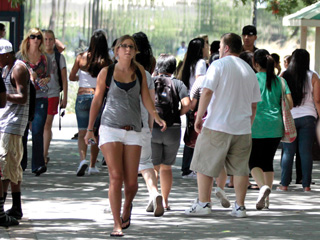The Speech and Hearing Clinic at Fresno State is offering free hearing evaluations to the campus community and the general public now through Nov. 20 all week long from 8 a.m. to 5 p.m.
Sabrina Nii, the director of the Speech and Hearing Clinic at Fresno State, said the free hearing evaluations not only help students and those in the community who don’t have the means, but it also helps graduate students. The students administer the free evaluations while under the supervision of licensed and nationally certified audiologists while earning credit hours towards graduation.
“This clinic benefits community members greatly by offering this free service to interested people as well as people who may not otherwise have access to a complete hearing evaluation,” Nii said. “The graduate students also benefit as they are able to earn the required 20 hours of clinical experience in audiology without having to leave campus.”
There are three parts to a hearing evaluation. The first is a review of a patient’s medical and hearing history, then a visual examination of the eardrums and ear canals and finally the hearing test.
During the hearing test, graduate students place patients in a sound booth to test their hearing at different pitches (frequency) and decibel (dB) levels — the loudness of sound. Patients are then asked to listen to a series of specific sounds and indicate which ones they can hear by holding one of their hands up.
There is an allotted two hours for each hearing evaluation although some may be less depending on the client. Children have to be at least three years old to get a hearing evaluation. Once completed, the results of the evaluation are recorded on an audiogram, which graduate students will review with the patient.
Hearing loss is listed as the third most common health problem in the U.S. According to the American Academy of Audiology, approximately 36 million Americans suffer from hearing loss, more than half of whom are younger than those 65 or older.
If left untreated, hearing loss can affect a number of basic life functions, such as understanding individual speech sounds, and can have a negative impact on an individual’s social, emotional and mental well-being.
Some things that can cause hearing loss include exposure to excessive loud noise, ear infections, trauma or ear disease, damage to the inner ear and ear drum from contact with a foreign object, such as cotton swabs, and deteriorating hearing due to the normal aging process.
Signs to look for if you think you suffer from hearing loss include having trouble following conversations, hearing people when they are not facing you or in another room and difficulty hearing people talk in noisy environments.
The three main types of hearing loss are sensorineural hearing loss, conductive hearing loss and mixed hearing loss. The former is the most common and is sometimes preventable but if left untreated, can become permanent.
Blockage in the ear canal from a foreign object, earwax buildup and fluid occupying the middle ear space, which is often due to ear infections, are some possible causes of conductive hearing loss. Mixed hearing loss is essentially a blend of both sensorineural and conductive hearing loss.
Noise-induced hearing loss, which is caused by damage to the hair cells that are found in the inner ear, is permanent and is almost always preventable by avoiding loud noises, turning the volume down on devices such as a TV or an MP3 player and wearing hearing protection gear such as earplugs or earmuffs.
An audiologist — a professional who specializes in evaluating, diagnosing and treating people with hearing loss and balance disorders — can treat almost all types of hearing loss.
Nina Sandhu, a graduate student majoring in speech language pathology, said she loves giving people free hearing evaluations because she receives work experience while helping others.
“It is really good because sometimes adults will be in denial and they won’t do activities that they used to do like go out to dinner because they can’t hear with background noise or they won’t do activities like horseback riding or playing pool because they just can’t hear and they are embarrassed to keep asking ‘Oh, what did you say, what did you say?,’” Sandhu said.
Heidi Parks, a deaf education major, said she loves helping those with hearing needs and finds it fascinating to observe graduate students as they administer evaluations so she can better understand the process.
“I am learning more about the pathology of the ear and how testing and everything kind of works together to help children to either hear or to understand what problems they may have with their inner ear or outer ear,” Parks said.
Parks said her father, who is hard of hearing, inspired her to major in deaf education and help others with the same issue.
“All my life I kind of observed him having issues with communicating with others and so I kind of wanted to help children that have the same issues and be able to help teach them and help them to achieve their dreams and goals and be able to communicate better with other people,” Parks said. “I think it is amazing because there are so many services that are available to people that are not as fortunate as some people that have insurance.”
One of the many things Nii appreciates about the free hearing evaluations is that it is easy access for everybody.
“I personally like that the audiology clinics are here, on campus, which makes it convenient for students and community members to take advantage of this program,” Nii said.




